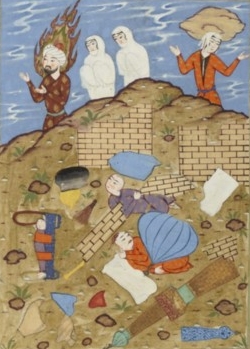

In what follows, one such instance will be briefly described. Since the story of Lot figures so prominently in Muslim discourse about homosexuality, the question can be raised whether Muslim exegesis of this story has also generated alternate interpretations that undermine the use of the story in religious condemnations of homosexuality.

Exegetical work on the story has increasingly shown that the sin of the “Sodomites” is not homosexuality as it is understood today, that is as consensual non-heterosexual relations, but rather concerns the aggressive abuse of strangers via anal rape (eg Bellis & Hufford, 97, Helminiak, 46-47). However, recently, those who argue for the continuation of a heteronormative standard in the Christian church, have more-or-less discontinued their appeal to the story of Lot and Sodom, instead focusing on other biblical texts such as Leviticus and the writings of Paul (eg Jordan, 194-5, Hays, 5 but see Gagnon, 71). These new non-qur’anic and non-biblical terms were then read back into the story of Lot to signify that it was primarily about the condemnation of these acts. Furthermore, just as the story of Lot in the Qur’an led to the invention of the Arabic word liwat (shorthand for the “the act of the people of Lot” meaning male anal intercourse), so also the story in the Bible gave rise to the term “sodomy” (shorthand for the “act of the people of Sodom” again meaning male anal intercourse). Likewise, the story of Lot and the cities of Sodom and Gemorrah in Genesis 19 in the Christian and Jewish scriptures also figures prominently in traditional Christian heteronormative discourses that attack homosexuality as depravity. These proscriptions against homosexuality are all rooted in the story of Lot as it is presented in the Qur’an. Lut’s people were addicted to this shameless depravity, abandoning natural, pure, lawful relations with women in the pursuit of this unnatural, foul and illicit practice (169). The story of the prophet Lut (Lot) as narrated in the Qur’an should be sufficient for us. The influential contemporary Egyptian Muslim scholar Yusuf al-Qaradawi, in his popular book Al-Halal wal-Haram fil Islam ( The Lawful and the Prohibited in Islam), describes homosexuality as a “sexual deviation” and “abominable practice”, arguing that: It is even viler and uglier than adultery (664). There is consensus among both Muslims and the followers of all other religions that sodomy is an enormity. In more than one place in the Holy Koran, Allah recounts to us the story of Lot’s people, and how He destroyed them for their wicked practice.
#CONTEXT OF STORY OF LUT QURAN MANUAL#
For example, a classic 14 th century manual of Islamic jurisprudence, Ahmad ibn Naqib al-Misri’s “Umdat al-Salik ( Reliance of the Traveller) states that: What is the position of Islam on homosexuality? A quick search through Muslim sources renders the answer that homosexuality is overwhelmingly considered haram or forbidden. Scriptural Sodom is a necessary battleground for queer believers of all the Abrahamic traditions (Shannahan, 676).

A Muslim Non-Heteronormative Reading of the Story of Lot: Liberation Theology for LGBTIQ Muslims?


 0 kommentar(er)
0 kommentar(er)
